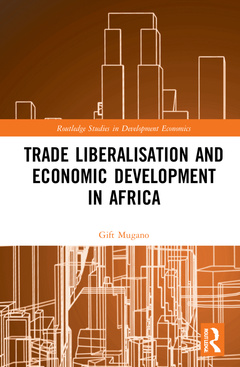Trade Liberalisation and Economic Development in Africa Routledge Studies in Development Economics Series
Auteur : Mugano Gift
Coordonnateur : Brookes Michael

This book provides a thorough and rigorous discussion on the impact of trade liberalisation on economic development with a special focus on the African continent. The author presents the rationale for trade liberalisation, trade liberalisation frameworks, the trade liberalisation economic development nexus, impediments to trade, and contemporary issues of international trade.
In this book, notwithstanding the benefits from trade liberalisation, the author shows that African trade as a share of global trade has remained flat at 3% as in 1975, while the continent?s exports have remained raw materials and its intra-regional trade at less than 15% of total trade, which is the lowest in the world (UNCTAD, 2020). With respect to key economic development indicators such as economic growth, poverty levels, and employment levels, this book shows that, ironically and in direct contrast with the conventional views that trade liberalisation alleviates poverty, trade liberalisation in Africa has resulted in high levels of unemployment and low economic growth which ultimately lead to increased poverty. In addition, this book provides a detailed analysis of why trade liberalisation has failed to yield meaningful benefits to Africa. The binding constraints and blockages which prevent positive spin-offs on trade liberalisation in Africa are discussed in detail in this book.
In the same vein, the author provides practical strategies which must be adopted by African countries in order to gain from trade liberalisation, making this work a must-read for African governments, academia, trade experts, regional trading blocs, the World Trade Organization, and development partners. In view of this, and as part of the disruptive and structural transformation policies, the author discusses case studies and international experience contextualised to Africa as well as strategies for addressing the trade-related infrastructure gap, production capacities, export promotion, and aid for trade.
Part I: Trade Liberalisation Paradox 1. The Rationale of Trade Liberalisation 2. Trade liberalisation Frameworks 3. Obstacles and Barriers to Regional Integration in Africa 4. Trade Liberalisation Nexus Economic Development 5. Contemporary Issues in International Trade Part II: How Africa Must Respond 6. Closing Trade Related Infrastructure Gaps in Africa 7. Building Production Capacities 8. Enhancing Utilisation of Existing Manufacturing Capacities in Africa 9. Enhancing Production through Value Chains 10. Export Promotion Strategies in South Korea: Lessons for Africa 11. Role of Aid For Trade and Development Partners 12. Reflecting on Trade Liberalisation and Economic Development in Africa
Gift Mugano (PhD) is an Adjunct Professor of Economics at the Durban University of Technology and Nelson Mandela University. He is a distinguished scholar and global authority on international trade and finance with over 16 years of extensive experience including research and publications, policy advisory, trade negotiations, lecturing, administration, leadership, and consultancy work.
Michael Brookes (PhD) is a Professor of Human Resource Management at the University of Southern Denmark, Slagelse, Denmark, and Research Associate at Nelson Mandela University as well as Director of the Khanyisa Project, a non-profit partnership seeking to address employability issues in the Eastern Cape of South Africa.
Date de parution : 05-2023
15.6x23.4 cm
Date de parution : 09-2021
15.6x23.4 cm
Thèmes de Trade Liberalisation and Economic Development in Africa :
Mots-clés :
Trade Liberalisation; African Development Bank; economic development Africa; EU Free Trade Agreement; African trade; Duty Drawback Scheme; trade liberalisation frameworks; Trade Facilitation; trade liberalisation economic development nexus; FDI; contemporary issues of international trade; Intra-regional Trade; impediments to trade; Local Content Policies; global trade and Africa; Export Promotion Strategies; poverty levels; SACU; employment levels; FDI Flow; trade liberalisation Africa; FDI Inflow; trade related infrastructure gap; Regional Trade Agreements; export promotion Africa; Diaspora Bond; aid for trade; Official Development Assistance; SACU Country; WTO Aid; Export Diversification; EAC; Export Subsidies; World Foreign Direct Investment Inflows; RECs; Bretton Woods Institutions; Trade Diversion; Asian Development Bank



